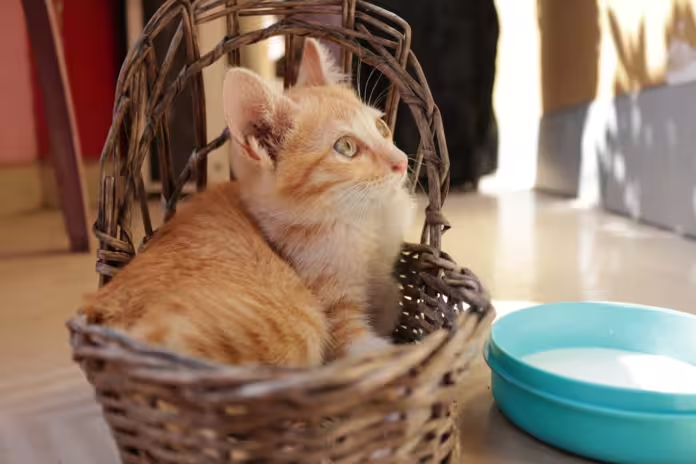Many people associate cats with a bowl of milk, picturing it as the perfect treat for a content feline. However, can cats drink milk safely? This age-old question has been the subject of debate among pet owners, and understanding the facts can help you make better choices for your cat’s health. In this article, we’ll explore the real reasons behind the milk-and-cats myth, what the risks are, and offer alternatives that your cat will enjoy.
H2: Can Cats Drink Milk? Understanding the Myth
The Origins of the Cats-and-Milk Connection
The idea that cats drink milk likely stems from historical practices. Farm cats, often seen drinking from milk buckets or catching drips, enjoyed it as a rare treat. This image became ingrained in our culture, symbolizing a happy and well-fed cat. However, today’s understanding of feline nutrition tells a different story—one that challenges the long-standing myth.
Why Most Cats Are Lactose Intolerant
Contrary to popular belief, most adult cats are lactose intolerant. As kittens, they have the enzyme lactase, which helps them digest their mother’s milk. But as they grow, they often lose this enzyme, making it difficult for them to digest dairy products. When a lactose-intolerant cat drinks milk, it can lead to stomach upset, diarrhea, and other digestive issues, making milk a problematic treat.
The Risks of Offering Milk to Cats
Feeding milk to your cat can have several health risks. In addition to digestive discomfort, milk is also high in fat, which can contribute to obesity in cats if consumed regularly. The fat content can lead to weight gain and associated health issues, such as diabetes. Offering milk as a regular part of your cat’s diet could ultimately do more harm than good.
H2: Healthier Alternatives to Milk for Cats
Safe and Nutritious Treats for Your Cat
Instead of offering milk, consider healthier alternatives that are safe for feline consumption. Options like water-rich cat treats, specially formulated cat milk (which is lactose-free), or even small amounts of wet food can provide the hydration and taste your cat craves without any digestive trouble.
Incorporating More Hydration in Your Cat’s Diet
Cats often don’t drink enough water, so finding ways to keep them hydrated is crucial. Adding a bit of moisture to their regular diet with wet food or feline-friendly broths can be a great alternative. These options not only provide necessary hydration but also avoid the risks associated with dairy consumption.
H2: Fun Stories and Common Misunderstandings About Cats and Milk
Funny Tales from Cat Owners
Some cat owners share humorous stories about their cat’s reaction to milk. A curious sip may result in a delighted face, only to be followed by an urgent run to the litter box. These stories highlight the fact that while cats may be intrigued by milk, their bodies often disagree!
Debunking Myths: Why Cats Don’t Really Need Milk
Despite the iconic imagery of cats lapping up milk, it’s time to debunk the myth. Milk is not a necessary part of a cat’s diet, and any nutritional benefits are better obtained from their regular food. Understanding this can prevent unnecessary health problems and ensure your feline friend thrives.
H2: Practical Tips for Cat Owners
What to Do If Your Cat Loves Milk
If your cat insists on tasting milk, there are feline-safe alternatives available. Lactose-free cat milk is designed to be easier on their stomachs, allowing them to enjoy a dairy-like treat without the discomfort. Moderation is key, and it’s always best to consult with your veterinarian before making any dietary changes.
How to Keep Your Cat’s Diet Balanced
A balanced diet is crucial for a cat’s overall well-being. Make sure to provide a mixture of high-quality dry and wet food, avoid unnecessary treats, and focus on what will keep them healthy long-term. Avoiding human foods like milk will help you maintain their optimal health and energy levels.
Conclusion: Separating Myth from Reality
The association between cats and milk is a myth that has persisted for generations, but it’s time to recognize the reality. Most adult cats cannot digest milk properly, and offering it can lead to health issues. By choosing healthier alternatives and understanding your cat’s dietary needs, you can ensure their well-being while still treating them to occasional delights. Next time you see your cat curiously eyeing a bowl of milk, remember that they’ll be just as happy—and much healthier—with a safer snack.
Last Updated on October 26, 2024 by Matt Lee


